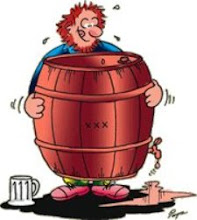So, InBev have bought out Anheuser-Busch eh? Well, well, well… This makes InBev (to be rechristened Anheuser-Busch InBev in the wake of the deal) one of the 5 largest consumer product companies in the world, with a global beer volume of 460 million hectolitres per annum – equivalent to a staggering 80,950,800,000 pints.
This makes InBev (to be rechristened Anheuser-Busch InBev in the wake of the deal) one of the 5 largest consumer product companies in the world, with a global beer volume of 460 million hectolitres per annum – equivalent to a staggering 80,950,800,000 pints. Although the move was opposed by Anheuser-Busch CEO August Busch IV he was ultimately left with little choice in the matter; the family hold only 4% of the company share total, and were facing the possibility of legal action by other shareholders had they continued to resist the buyout.
Although the move was opposed by Anheuser-Busch CEO August Busch IV he was ultimately left with little choice in the matter; the family hold only 4% of the company share total, and were facing the possibility of legal action by other shareholders had they continued to resist the buyout.
In the end it took $52 billion (£26.1 billion) to secure the deal, equivalent to a share price of $70. August Busch IV will now sit on the board of directors with InBev, and Budweiser will be developed into what InBev are calling “a global flagship brand”.
So what does all this mean for the UK? Well, as far as I can see very little in real terms; it will certainly significantly strengthen InBev’s already powerful presence over here (their existing brands include Hoegarden, Leffe, Boddingtons, Bass, Murphys, Tennents and Skol), and we can probably expect even more damned Budweiser and Stella marketing, but for the lager drinkers it’ll be business as usual given the prevalence of these two core brands within the market already, and for the Real Ale community, well, it doesn’t make a blind bit of difference really – we won’t drink the stuff regardless of who owns it. The USA on the other hand is a different matter; the land of Capitalism may smile upon hostile takeovers and mercenary mercantile manipulations when they’re being perpetrated by Good Ole’ Yankee companies, but they don’t seem to like it when the boot’s on the other foot. Already there are businesses refusing to stock any of the Budweiser range in protest at what is seen as filthy foreign conduct.
The USA on the other hand is a different matter; the land of Capitalism may smile upon hostile takeovers and mercenary mercantile manipulations when they’re being perpetrated by Good Ole’ Yankee companies, but they don’t seem to like it when the boot’s on the other foot. Already there are businesses refusing to stock any of the Budweiser range in protest at what is seen as filthy foreign conduct. Ultimately though this is simply one more chapter in the continuing sad story of brand amalgamation and corrosion of identity within the world beer market; the only way to beat the system and ensure you can enjoy a beer with a character and identity all of its own is to keep on drinking real ale and be thankful for craft brewers who are too small to be of interest to the corporate sharks – after all, there’s always a chance that someone like InBev might decide to gobble up Greene King!
Ultimately though this is simply one more chapter in the continuing sad story of brand amalgamation and corrosion of identity within the world beer market; the only way to beat the system and ensure you can enjoy a beer with a character and identity all of its own is to keep on drinking real ale and be thankful for craft brewers who are too small to be of interest to the corporate sharks – after all, there’s always a chance that someone like InBev might decide to gobble up Greene King!
Pan-C
- InBev, based in Leuven, Belgium, traces its origins back to 1366. Today’s company, created through the merger of Interbrew, of Belgium, and AmBev, of Brazil, has more than 200 brands, including Stella Artois, Beck’s, Leffe, Hoegaarden, Skol, Quilmes and Jupiler. The Euronext-listed group employs 89,000 people in 30 countries across the Americas, Europe and Asia-Pacific.
- Anheuser-Busch (AB) started life in 1860 when Eberhard Anheuser acquired the Bavarian brewery in St Louis, Missouri. His son-in-law Adolphus Busch, a German immigrant, joined the business in 1864. It is America’s biggest brewer, with 48.5 per cent of the market. Budweiser and Bud Light are the world’s biggest beer brands. It also owns stakes in Modelo, the Mexican brewer, and Tsingtao, the Chinese beer-maker.
(SOURCE: The Times, Tuesday July 15th, 2008)




As long as I can renegotiate my beer tie contract with them if they do buy Greene King, I don't mind!
ReplyDelete